Phase 1 construction at the 3.8-Mtpa Kakula Copper Mine in D.R. Congo approximately 80% complete; commissioning of concentrator plant now underway, with initial production on track for July 2021
Kamoa-Kakula’s pre-production ore stockpiles hold more than 2.16 million tonnes grading 4.44% copper, containing more than 95,000 tonnes of copper
Kakula’s Phase 2 expansion, scheduled for Q3 2022, will double concentrator throughput to 7.6 Mtpaand annual copper output up to approximately 400,000 tonnes
Ivanhoe’s geological team searching for next tier-one copper discovery on Ivanhoe’s Western Foreland licences near the Kamoa-Kakula Project
Arrangements for project-level financing of up to $420 million to advance development of the world-scale Platreef palladium, platinum, rhodium, nickel, copper and gold project in South Africa
TORONTO, CANADA ‒ Ivanhoe Mines (TSX: IVN; OTCQX: IVPAF) today announced its financial results for the year ended December 31, 2020. Ivanhoe Mines is a Canadian mining company advancing its three mining projects in Southern Africa: the Kamoa-Kakula copper discovery in theDemocratic Republic of Congo (DRC); the Platreef palladium-platinum-rhodium-nickel-copper-gold discovery in South Africa; and the extensive upgrading of the historic Kipushi zinc-copper-lead-germanium mine, also in the DRC. All figures are in U.S. dollars unless otherwise stated.
HIGHLIGHTS
- Development of the Kakula Mine, the first of multiple, planned mining areas at Ivanhoe Mines’ Kamoa-Kakula joint-venture copper project, is making excellent progress. Overall development of Kamoa-Kakula’s first phase, 3.8-million-tonne-per-annum (Mtpa) mining and milling operation is approximately 80% complete; first copper concentrate production remains on track for July 2021.
- At the end of December 2020, Kamoa-Kakula’s pre-production surface stockpiles contained approximately 1.52 million tonnes of high-grade and medium-grade ore at an estimated blended grade of 4.03% copper, containing more than 61,000 tonnes of copper, with a cost of only $110 million allocated to the stockpile. The combined pre-production high- and medium-grade ore surface stockpiles increased to approximately 2.16 million tonnes at an estimated grade of 4.44% copper at the end of February 2021.
- Kamoa-Kakula’s Phase 2 expansion is progressing to plan and is scheduled for Q3 2022 start-up, which will see a doubling of mill throughput to 7.6 Mtpa. Phases 1 and 2 combined are forecast to produce up to approximately 400,000 tonnes of copper per year. Based on independent benchmarking, the project’s phased expansion scenario to 19 Mtpa would position Kamoa-Kakula as the world’s second-largest copper mining complex, with peak annual copper production of more than 800,000 tonnes.
- Given the current copper price environment, Ivanhoe, together with its partner Zijin, is exploring the acceleration of the Kamoa-Kakula Phase 3 concentrator expansion from 7.6 Mtpa to 11.4 Mtpa, which may be fed from expanded mining operations at Kansoko or a new mining area at Kamoa North (including the Bonanza Zone). Kamoa Copper also is refining its longer-term downstream processing strategy, including the potential construction of a smelter or hydrometallurgical processing facility.
- In December 2020, the Kamoa-Kakula Copper Project secured $420 million in project-level credit facilities, including a EUR176 million ($211 million) covered equipment financing facility with a $9 million down-payment facility, and a $200-million line of credit from Zijin Mining. The credit facilities will be used, in part, to construct Kamoa-Kakula’s Phase 2 expansion to 7.6 Mtpa.
- In late December 2020, Kamoa-Kakula successfully completed conditions precedent of the equipment financing facility and drew down an initial tranche of $56 million from the facility, and $9 million from the down-payment facility.
- In order to support its growth plans, future capital needs and widen shareholder appeal, Ivanhoe Mines is considering the viability of seeking a secondary stock exchange listing on one or more international stock exchanges. Any such listing would be subject to market conditions and meeting listing requirements.
- Other engineering and construction activities underway at Kamoa-Kakula include the completion of upgrades at the Mwadingusha hydro-electric power plant and associated 220-kilovolt infrastructure to supply the mine with clean, renewable hydropower. The Mwadingusha hydropower plant is expected to deliver approximately 78 megawatts of power to the national electrical grid ahead of the start-up of the Kakula concentrator.
- A 2020 independent audit of Kamoa-Kakula’s greenhouse gas intensity metrics performed by Hatch Ltd. of Mississauga, Canada, confirmed that the project will be among the world’s lowest greenhouse gas emitters per unit of copper produced. Kamoa-Kakula’s outstanding economics are combined with first-class sustainability and social initiatives in keeping with the project’s goal of producing the world’s “greenest copper”.
- In 2020, Ivanhoe received environmental certificates on a large package of 100%-owned Western Foreland exploration licences that were acquired in 2019. Ivanhoe plans to soon commence an expansive exploration program on its Western Foreland licences that now total approximately 2,550 square kilometres of highly prospective land holdings in the vicinity of the Kamoa-Kakula mining licence. Ivanhoe’s DRC exploration group is targeting high-grade Kamoa-Kakula-style copper mineralization through a regional exploration and drilling program on the Western Foreland ground, which shares the same geological setting as Kamoa-Kakula.
- In February 2021, Ivanhoe announced that the company’s South African subsidiary, Ivanplats, is arranging project-level financing of up to $420 million to advance development of the world-scale Platreef palladium, platinum, rhodium, nickel, copper and gold project in South Africa.
- Ivanplats has signed a non-binding term sheet with Orion Mine Finance, a leading international provider of production-linked stream financing to base and precious metals mining companies, for a $300 million gold, palladium and platinum streaming facility. Ivanplats also has appointed two prominent, international commercial banks – Societe Generale and Nedbank – as mandated lead arrangers for a senior project debt facility of up to $120 million.
- Ivanplats’ proposed financings follow the November 30, 2020 issuance of the outstanding findings of an independent Platreef Integrated Development Plan 2020 (Platreef IDP20), which consists of an updated feasibility study (Platreef 2020 FS) and a preliminary economic assessment (Platreef 2020 PEA). The initial capital cost for the phased development plan under the Platreef 2020 PEA, starting at a mining rate of 700,000 tonnes per annum (700 ktpa), is estimated at $390 million.
- The Platreef IDP20 reflects the first phase of development for the Platreef Mine. It is designed to establish an operating platform to support potential future expansions up to 12 Mtpa, per previous studies. This would position Platreef among the largest platinum-group-metals mines in the world, producing in excess of 1.1 million ounces of palladium, platinum, rhodium and gold per year.
- Detailed engineering is underway on Platreef’s 700-ktpa initial mine design, 770-ktpa concentrator and associated infrastructure for the phased development plan, which is scheduled to be incorporated into an updated feasibility study before the end of 2021. The Shaft 1 changeover is progressing well in preparation for permanent hoisting by early 2022.
- At the Kipushi Mine redevelopment project in the DRC, the Kipushi Project’s draft feasibility study, and development and financing plan are being reviewed by Ivanhoe Mines together with its joint-venture partner and state-owned mining company, Gécamines. The project is maintaining a reduced workforce to conduct maintenance activities and pumping operations.
- Ivanhoe has made excellent progress in upgrading Kipushi’s underground infrastructure to allow for mining to quickly begin at the ultra-high-grade Big Zinc orebody. Resumption of production at the mine now requires the construction of a surface processing plant and other related surface production facilities. Discussions are continuing with Gécamines to advance a new era of production at Kipushi andit is anticipated that these discussions will be concluded with the finalization of the feasibility study and the agreement on the development and financing plan by mid-2021.
- At the end of 2020, Kamoa-Kakula had reached 2.6 million work hours free of a lost-time injury, Kipushi had reached 2.9 million work hours free of a lost-time injury, and Platreef had reached 59,000 work hours free of a lost-time injury.
Principal projects and review of activities
1. Kamoa-Kakula Project
39.6%-owned by Ivanhoe Mines
Democratic Republic of Congo
The Kamoa-Kakula Project, a joint venture between Ivanhoe Mines and Zijin Mining, has been independently ranked as the world’s fourth-largest copper deposit by international mining consultant Wood Mackenzie. The project is approximately 25 kilometres west of the town of Kolwezi and about 270 kilometres west of Lubumbashi.
Ivanhoe sold a 49.5% share interest in Kamoa Holding Limited (Kamoa Holding) to Zijin Mining in December 2015 for an aggregate consideration of $412 million. In addition, Ivanhoe sold a 1% share interest in Kamoa Holding to privately-owned Crystal River for $8.32 million – which Crystal River will pay through a non-interest-bearing, 10-year promissory note. Since the conclusion of the Zijin transaction in December 2015, each shareholder has been required to fund expenditures at the Kamoa-Kakula Project in an amount equivalent to its proportionate shareholding interest in Kamoa Holding.
A 5%, non-dilutable interest in the Kamoa-Kakula Project was transferred to the DRC government on September 11, 2012, for no consideration, pursuant to the 2002 DRC mining code. Following the signing of an agreement with the DRC government in November 2016, in which an additional 15% interest in the Kamoa-Kakula Project was transferred to the DRC government, Ivanhoe and Zijin Mining now each hold an indirect 39.6% interest in the Kamoa-Kakula Project, Crystal River holds an indirect 0.8% interest and the DRC government holds a direct 20% interest. Kamoa Holding holds an 80% interest in the project.
The Kakula Mine, with the main pre-production ore stockpiles in the foreground, Kakula’s northern decline (in red circle), and the concentrator and backfill plants in the background.
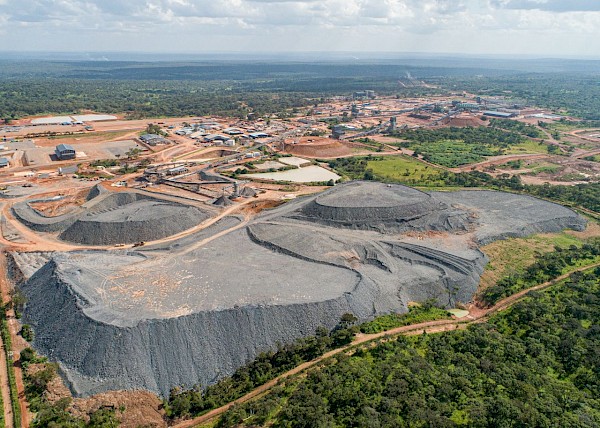
Health and safety at Kamoa-Kakula
At the end of 2020, the Kamoa-Kakula Project reached 2,618,438 work hours free of a lost-time injury. The project continues to strive toward its workplace objective of zero harm to all employees and contractors.
Kamoa-Kakula continues to focus on prevention, preparation and mitigation in managing the risks associated with COVID-19. Large-scale testing, combined with focused preventative measures, ensures that positive cases are quickly identified, isolated and treated, with cross contamination kept to a minimum.
The project has a well-established COVID-19 isolation facility at the Kamoa Camp. Suspected cases and positive patients are moved to this facility, where they are isolated and treated. Once patients have recovered and are deemed no longer infectious, they can return to work only after an additional quarantine period determined by the project’s medical staff.
Kamoa-Kakula has successfully treated a number of symptomatic patients in the Kamoa Hospital, where highly-experienced doctors and nurses apply the latest medical treatments in a world-class facility.
As the pandemic evolves, the medical team at Kamoa-Kakula continues to review and update its risk mitigation protocols, while ensuring that new medical advances are investigated and applied to protect the health and safety of the workforce and community members.
The new Kamoa Hospital is a world-class medical facility featuring state-of-the-art equipment and highly-experienced doctors, nurses and paramedics.
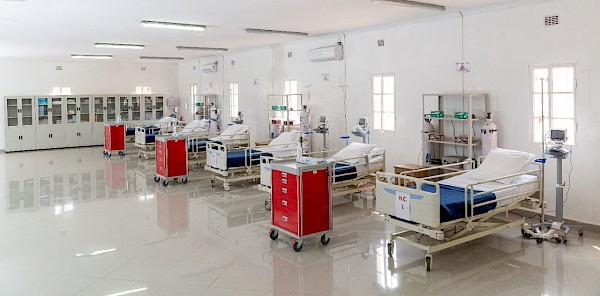
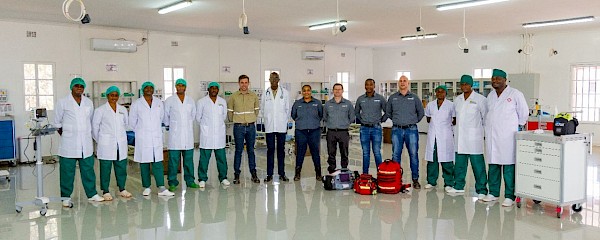
Outstanding economic results of the Kamoa-Kakula Integrated Development Plan 2020
On September 8, 2020, Ivanhoe Mines announced the results of an independent Integrated Development Plan (IDP) for the Kamoa-Kakula Project. The Kamoa-Kakula Integrated Development Plan 2020 encompasses three development scenarios:
- The definitive feasibility study (DFS) for stage one Kakula Mine development. The Kakula 2020 DFS evaluates the initial development of a 6.0-Mtpa underground mine and surface processing complex at the Kakula Deposit with a capacity of 7.6 Mtpa, built in two modules of 3.8 Mtpa, with the first already under advanced construction.
- The pre-feasibility study (PFS) including Kansoko Mine development. The Kakula-Kansoko 2020 PFS evaluates the development of mining activities at the Kansoko Deposit in addition to the Kakula Mine, initially at a rate of 1.6 Mtpa to fill the concentrator at Kakula, eventually ramping up to 6.0 Mtpa as the reserves at Kakula are depleted.
- The expanded, subsequent development to four producing mines. The Kamoa-Kakula 2020 preliminary economic assessment (PEA) includes an analysis of the potential for an integrated, 19-Mtpa multi-stage development, beginning with initial production from the Kakula Mine, to be followed by subsequent, separate underground mining operations at the nearby Kansoko, Kakula West and Kamoa North mines, along with the construction of a direct-to-blister smelter. The Kamoa North area comprises five separate mines that would be developed as resources are mined out elsewhere, to maintain the production rate at up to 19 Mtpa, with an overall life in excess of 40 years.
The Kamoa-Kakula IDP 2020 was independently prepared on a 100%-basis by OreWin Pty Ltd. of Adelaide, Australia; China Nerin Engineering Co., Ltd., of Jiangxi, China; DRA Global of Johannesburg, South Africa; Epoch Resources of Johannesburg, South Africa; Golder Associates Africa of Midrand, South Africa; KGHM Cuprum R&D Centre Ltd. of Wroclaw, Poland; Outotec Oyj of Helsinki, Finland; Paterson and Cooke of Cape Town, South Africa; Stantec Consulting International LLC of Phoenix, USA; SRK Consulting Inc. of Johannesburg, South Africa; and Wood plc of Reno, USA.
Highlights of the Kakula 2020 DFS, initial 6-Mtpa mine at Kakula, include:
- The Kakula 2020 DFS evaluates the development of a stage one, 6.0-Mtpa underground mine with a surface processing complex at the Kakula Deposit with a capacity of 7.6 Mtpa, built in two modules of 3.8 Mtpa, with the first already under advanced construction. For this option, the DFS envisages an average annual production rate of 284,000 tonnes of copper at a mine-site cash cost of $0.52 per pound (lb) copper and total cash cost of $1.16/lb copper for the first 10 years of operations, and annual copper production of up to 366,000 tonnes by year four.
- Remaining initial capital cost of $0.65 billion for this option would result in an after-tax net present value at an 8% discount rate (NPV8%) of $5.5 billion.
- The internal rate of return of 77.0% and project payback period of 2.3 years confirm the compelling economics for the Kamoa-Kakula Project’s stage one of production.
- Kakula benefits from an ultra-high feed grade averaging 6.6% copper over the first five years of operations, and 5.2% copper on average over a 21-year mine life.
Nadege Santos, Construction Secretary – one of thousands of bright, talented Congolese who are helping to transform Kamoa-Kakula into the world’s next great copper mine. Kamoa Copper is focused on driving positive change for women in mining.

Highlights of the Kakula-Kansoko 2020 PFS, which incorporates Kansoko mine development, include:
- The Kakula-Kansoko 2020 PFS evaluates the development of mining activities at the Kansoko Deposit in addition to Kakula, initially at a rate of 1.6 Mtpa to fill the 7.6-Mtpa concentrator at Kakula, eventually ramping up to 6.0 Mtpa as the reserves at Kakula are depleted. For this option, the PFS envisages an average annual production rate of 331,000 tonnes of copper at a mine-site cash cost of $0.55/lb copper and total cash cost of $1.23/lb copper for the first 10 years of operations, and annual copper production of up to 427,000 tonnes by year four.
- Remaining initial capital cost of $0.69 billion for this option would result in an after-tax net present value at an 8% discount rate (NPV8%) of $6.6 billion. The internal rate of return of 69.0% and project payback period of 2.5 years confirm the compelling economics of Kakula and Kansoko.
- The combined Kakula-Kansoko production benefits from an ultra-high feed grade averaging 6.2% copper over the first five years of operations, and 4.5% copper on average over a 37-year mine life.
Highlights of the modular, integrated, expanded development option potential for the Kakula and Kamoa deposits, mining a total of 19 Mtpa, with construction of a direct-to-blister smelter, include:
- The Kamoa-Kakula 2020 PEA presents an additional development option of a multi-stage, sequential operation on Kamoa-Kakula’s high-grade copper deposits.
- Initial production from the Kakula Mine at a rate of 6.0 Mtpa, followed by subsequent, separate underground mining operations at the nearby Kansoko, Kakula West and Kamoa North mines, along with the construction of a direct-to-blister smelter. The Kamoa North Area comprises five separate mines that will be developed as resources are mined out elsewhere, to maintain the production rate at up to 19 Mtpa, with an overall life in excess of 40 years.
- For the integrated, 19-Mtpa, multi-stage development, the PEA envisages $0.7 billion in remaining initial capital costs. Future expansion at the Kansoko Mine, Kakula West Mine and Kamoa North mines would be funded by cash flows from the Kakula Mine, resulting in an after-tax net present value at an 8% discount rate (NPV8%) of $11.1 billion, an internal rate of return of 56.2%, and a payback period of 3.6 years.
- Under this approach, the PEA also contemplates the construction of a direct-to-blister copper smelter at the Kakula plant site with a capacity to process one million tonnes of copper concentrate per annum to be funded from internal cash flows. This would be completed in year five of operations, achieving significant savings in treatment charges and transportation costs.
- The 19-Mtpa scenario shows the potential for average annual production of 501,000 tonnes of copper at a total cash cost of $1.07/lb copper during the first 10 years of operations, and production of 805,000 tonnes of copper by year eight.
- At this future production rate, Kamoa-Kakula would rank as the world’s second largest copper mine.
The capital costs incurred by the Kamoa-Kakula joint venture in 2019 amounted to $309.1 million, of which $125.2 million was spent on the Kakula declines and mine development. A further capital cost of $643 million, which includes the costs allocated to the pre-production ore stockpiles, has been incurred in 2020. Ivanhoe’s share of the capital costs incurred in 2020 was $318 million, representing its share of approximately 40% of the initial capital costs, plus its share of capital associated with the 20% carried interest owned by the Government of the DRC, which will be repaid through future cash flows from the project. Ivanhoe has budgeted $154 million for its proportionate funding of approximately 50% for the Kamoa-Kakula Project for 2021. As of December 31, 2020, the joint venture had an estimated $336 million of capital costs remaining until initial production.
Ivanhoe expects that it will have sufficient cash resources, or financing options available, to cover its proportionate share of the remaining initial capital costs.
Draw down of equipment financing facility successfully commenced
On December 1, 2020, Ivanhoe announced the Kamoa Holding joint venture had secured an equipment financing facility of up to EUR 176 million (approximately $211 million), together with a $9 million down-payment facility to be used by the Kamoa-Kakula Project to purchase underground mobile mining equipment and services from leading Swedish manufacturers Sandvik AB and Epiroc AB, and Finnish manufacturer Normet Oy.
The facility has an availability period of three years and amortizes over a period of five years from utilization and is tied to underground mining equipment at the Kamoa-Kakula Project. The Swedish Export Credit Agency (EKN) has provided both political and commercial cover to the lenders and receives a one-off premium per tranche’s first utilization.
The EKN guarantee is for an amount up to 85% of the export contract value from the equipment suppliers, and hence the determining factor in the sizing of the equipment finance facility. In order to optimize the overall funding package, a portion of the equipment purchase not covered under the EKN guarantee is being provided by Standard Bank DRC under the down-payment facility.
After the completion of all conditions precedent, the Kamoa-Kakula Project completed the draw-down of an equivalent $56 million of the equipment financing and $9 million of the down-payment facilities in late December 2020 to account for the large fleet of mobile mining equipment already purchased and in operation at the Kakula Mine. Further drawdowns under the equipment finance facilities remain subject to a number of conditions precedent customary for facilities of this nature. The company expects the conditions precedent to be met prior to each utilization.
The equipment finance is secured only by the equipment that is being financed. The down-payment facility is unsecured. No guarantee is required from any of the sponsors or parent companies with Kamoa Holding Limited issuing a non-binding Letter of Support, confirming its support for the project.
In addition, Gold Mountains (H.K.) International Mining Company, a subsidiary of Zijin Mining Group, has provided Kamoa Holding Limited with a limited recourse line of credit of $200 million secured by the project’s pre-production ore stockpiles to fund the Phase 2 concentrator expansion. Kamoa Holding has not yet drawn on this line of credit.
Excellent construction progress being made on Kakula’s concentrator plant; first production expected in July 2021
Overall progress of Kamoa-Kakula’s first-phase, 3.8-Mtpa mining and milling operation (covering mine infrastructure, concentrator plant and surface infrastructure) was approximately 68% complete as of the December 2020 measurement, and progressed to approximately 78% as of the January 2021 measurement.
Construction progress on the project’s first phase 3.8-Mtpa concentrator plant and associated facilities is advancing rapidly and was approximately 43% complete in early December 2020 and approximately 62% as of the January 2021 measurement. C1 commissioning has commenced and the concentrator plant remains on track to be mechanically complete in Q2 2021, with first copper concentrate production scheduled for July 2021. The project and construction teams have consistently achieved the milestone dates despite the challenges presented by the COVID-19 pandemic, and have placed Kamoa-Kakula in a position to commission earlier than initially planned in Q3 2021.
Civil works for the first concentrator plant is effectively complete and the civil contractor now is focused on the Phase 2 concentrator plant, with work progressing in most areas.
Electrical, controls & instrumentation (EC&I) installation is the last activity before construction completion and subsequent commissioning. Cable installation and cable termination is well advanced, with more than 150,000 metres of copper cable installed out of a total of 207,000 metres (207 kilometres). The installation of instrumentation is well underway and the energizing of the concentrator plant with medium-voltage power is scheduled for the end of March 2021.
Kakula’s initial 3.8-Mtpa concentrator plant, the flotation cells (green) and ball mills (yellow) are more than 85% complete and commissioning now underway. The foundations for the second 3.8-Mtpa concentrator plant are on the left.
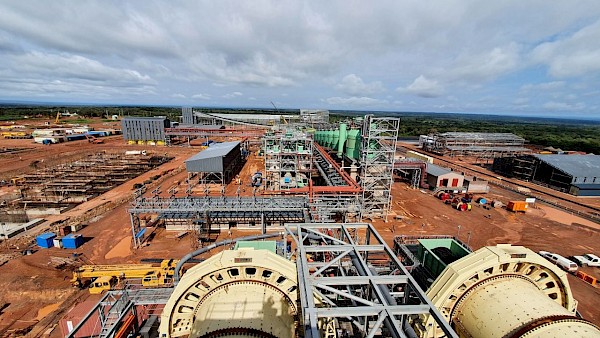
Kakula’s Phase 1 backfill plant is nearing completion. Approximately one half of the mine’s tailings will be sent back underground as paste backfill to help support mined-out areas.
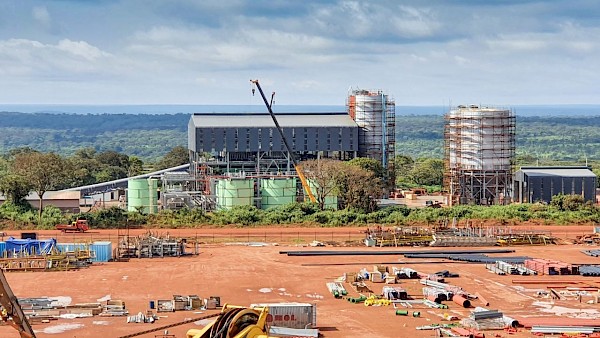
Engineering, procurement and construction of other surface infrastructure rapidly progressing
Beijing-based CITIC Construction Co., Ltd. is building Kakula’s first phase, backfill paste plant. The backfill plant will be used to mix tailings from the concentrator plant with cement to produce paste backfill. The backfill will be pumped back into the mine and used to help support mined-out areas. Approximately one half of the mine’s tailings will be sent back underground, significantly reducing the surface tailings storage. Construction of the backfill plant is progressing in parallel with the concentrator plant and is expected to be commissioned in July 2021.
Construction of the tailings storage facility is progressing well and is scheduled to be completed well ahead of the required date.
Construction of the surface bulk reclaim tip, bypass conveyor system and run-of-mine stockpile feed conveyor also is progressing well, with first commissioning and tie into the main decline conveyor planned for early 2021. The bulk reclaim tip system will be used to feed ore from Kakula’s surface stockpiles to the processing circuit, as well as ore from the Kansoko Mine when second phase operations begin.
In early March 2021, David Mitchell, Kasper Badenhorst and Morne Kruger (left to right), members of Kamoa Copper’s construction management team, oversaw the conveying of the first high-grade copper ore directly from Kakula’s underground mine to the run-of-mine stockpile adjacent to the Phase 1 concentrator plant.
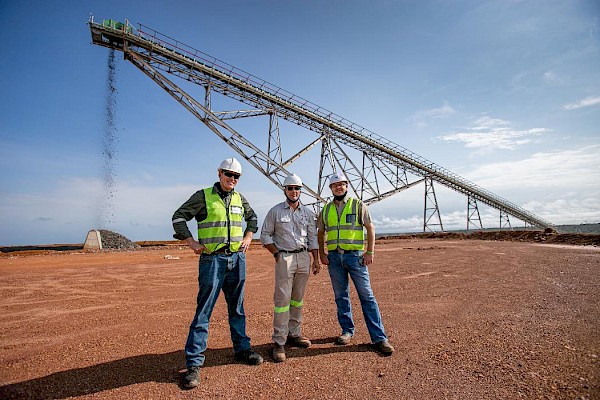
Underground development more than 10 kilometres ahead of plan at the end of 2020
A total of 29.8 kilometres of underground development was completed by the end of 2020, which was approximately 10.5 kilometres ahead of plan. Good progress continuing in early 2021 further increased the underground development to more than 35.5 kilometres at the end of February 2021, which is 12.4 kilometres ahead of schedule.
There currently are 10 mining crews (three owner crews and seven contractor crews) at Kakula and three owner crews at Kansoko. The project will continue to add additional crews to further accelerate development.
Holing of Kakula’s main north-south access drives in the high-grade centre of the deposit was achieved in November 2020. The holing has significantly increased ventilation to the centre of the orebody, allowing for additional mining crews to begin highly-productive mining operations in Kakula’s high-grade ore zones.
In addition to advancing the main connecting access drives, underground mining crews at Kakula are focused on preparation work for developing the high grade, drift-and-fill mining blocks in the centre of the orebody. Opening up of the mining footprint for these high grade, drift-and-fill mining areas entails development work in areas of low-, medium- and high-grade ore, and is designed to coincide with the start-up of the concentrator plant next year. This will allow mining crews to deliver significant volumes of high-grade ore directly from Kakula’s underground workings to the concentrator plant.
During 2020, cover drilling ahead of mining faces defined an approximate north-south water-bearing structure present to the west of the current mining areas. Flow rates and pressure readings are being monitored to further understand this zone and inform a hydrogeology model and dewatering strategy for this feature.
George Gilchrist, Ivanhoe Mines’ Vice President, Resources (right), and Franck Twite, Kamoa Copper’s Senior Supervisor, Geology (left), examining chalcocite ore from the Kakula Mine. In February 2021, 107,000 tonnes grading 9.01% copper were mined and stockpiled from the high-grade centre of the Kakula Mine.
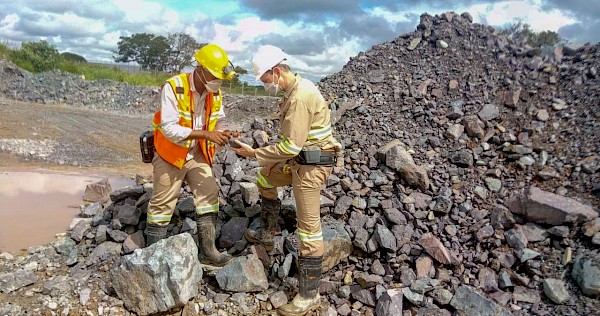
Pre-production ore stockpiles now contain approximately 2.16 million tonnes grading 4.44% copper
At the end of December 2020, Kamoa-Kakula’s pre-production surface stockpiles contained approximately 1.52 million tonnes of high-grade and medium-grade ore at an estimated blended grade of 4.03% copper, containing more than 61,000 tonnes of copper. Contained copper in the stockpiles increased by approximately 34,000 tonnes in Q4 2020, reflecting the mining in the ultra-high-grade centre of the Kakula Deposit.
The project’s combined medium-grade and high-grade ore mined was approximately 300,000 tonnes at an average grade of 5.45% copper in January, and approximately 339,000 tonnes at an average grade of 5.50% copper in February. This brings the project’s total pre-production high- and medium-grade ore surface stockpiles to approximately 2.16 million tonnes at an estimated grade of 4.44% copper as of the end of February 2021.
Kamoa-Kakula is on track to have more than three million tonnes of high-grade and medium-grade ore stockpiled on surface, holding more than 125,000 tonnes of contained copper, prior to the planned start of processing in July 2021. The tonnes and grade contained on the stockpiles are not additive to the Mineral Resource or Mineral Reserve.
Kamoa-Kakula’s international team of geologists standing in an ultra-high-grade underground access drift in the Kakula Mine, where the ore grade exceeds 6% copper.
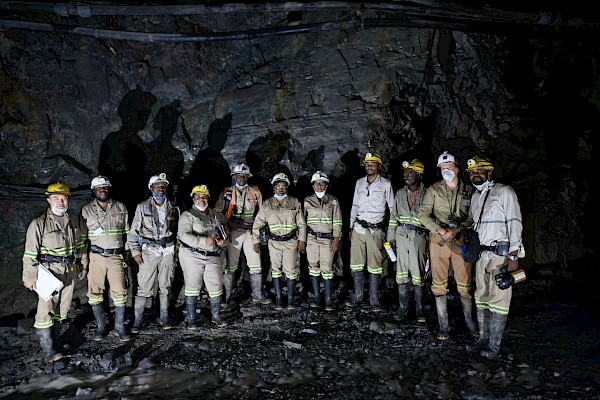
Discussions underway for the marketing of Kakula’s copper concentrates
Kamoa-Kakula is in detailed discussions with a number of parties with respect to the marketing and smelting of its copper concentrates. Kakula is expected to produce an extremely high grade and clean copper concentrate (containing over 55% copper) that will be highly coveted by copper smelters around the world. Metallurgical test work indicates that the Kakula concentrates contain extremely low arsenic levels by world standards – approximately 0.01%.
Kamoa-Kakula connected to the national power grid, providing clean, renewable 220-kV hydropower
The mine is receiving hydro-electric power for the Kamoa 120-kilovolt (kV) overhead line via the 18-megawatt mobile substation, which is connected to the national grid. Energizing of the permanent 35-kilometre, 220-kV power line connecting the New Western Dispatch substation in Kolwezi to Kamoa-Kakula, and thereby supplying the project with reliable and clean hydro-generated electricity from the national grid, was achieved in December 2020. This was a major milestone in securing permanent grid power for the project.
A 2020 independent audit of Kamoa-Kakula’s greenhouse gas intensity metrics performed by Hatch Ltd. of Mississauga, Canada, confirmed that the project will be among the world’s lowest greenhouse gas emitters per unit of copper produced.
The main 220-kV substation at the Kakula Mine is nearing completion and is expected to be energized by the end of March. The 35-kilometre-long double circuit 220-kV power line to Kamoa-Kakula connects the substation to the national electrical grid.
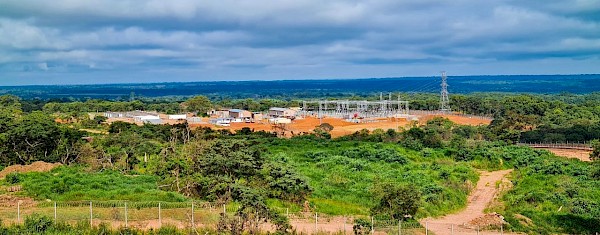
Ongoing upgrading work enables Mwadingusha hydropower station to supply clean, sustainable electricity
The upgrading work at the Mwadingusha hydropower plant is nearing completion with the synchronization of the first turbine achieved in December 2020. Electricity from all of Mwadingusha’s six turbines, with an upgraded output of 78 megawatts, is expected to be integrated into the national power grid in the second quarter of 2021.
The work is being conducted by engineering firm Stucky of Lausanne, Switzerland, under the direction of Ivanhoe Mines and Zijin Mining, in conjunction with the DRC’s state-owned power company, La Société Nationale d’Electricité (SNEL).
Construction of Phase 2 of the Kamoa-Kakula project well underway
Engineering, procurement and construction of the second phase of the project, which will double the mine’s processing capacity from 3.8 Mtpa to 7.6 Mtpa, is well underway. The EPCM contract for the plant and associated surface infrastructure was awarded to China ENFI Engineering Corporation.
Orders for all long-lead equipment have been placed and procurement of additional equipment is underway. Contracts for earthworks and civil construction have been awarded and work in the milling and stockpile areas are advancing well. The contract for supply of structural steel also has been awarded.
Contract employees installing rebar for the Phase 2 flotation circuit foundations.
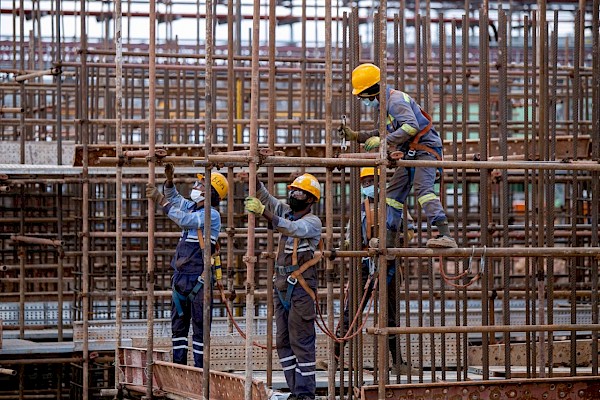
Enriching communities through sustainable development
The Sustainable Livelihoods Program was founded in 2010 in an effort to strengthen food security and farming capacity in the host communities near Kamoa-Kakula by establishing an agricultural training garden and support for farmers at the community level. Today, approximately 350 community farmers are benefiting from the Sustainable Livelihoods Program, producing high-quality food for their families and selling the surplus for additional income. The Sustainable Livelihoods Program, which commenced with maize and vegetable production, now includes both aquaculture and poultry. During 2020, an additional nine fish ponds were constructed and stocked. As Kamoa gears up to take the Livelihood Program to the next level, an agronomy school has been constructed and equipped to offer training programs to local farmers and serve as a research facility.
Additional non-farming-related activities for 2020 include education and literacy programs, the continuation of a community brick-making program and the supply of fresh water to a number of local communities using solar powered boreholes. During 2020, 27 additional boreholes were drilled in communities using local contractors, and a facility for a sewing program was constructed and equipped. A clinic, school, football pitch and two churches also are currently under construction.
Kamoa-Kakula conducted a number of interventions in respect of COVID-19 awareness and prevention. These include the donation of medication, rapid test kits, masks and hand-washing equipment to local communities.
Construction of resettlement houses for the second phase of the relocation program continued throughout the year with 27 families having been relocated. Relocation also took place for the third phase of the relocation program with 19 families relocated during the year. The survey for Kakula North and all crop compensation has been completed, with 108 people receiving compensation pursuant to the economic displacement of their crops and farming structures. The entire Kakula Mine area, including the tailings dam area, will be secured once these relocation phases are complete.
Local women harvesting bananas grown at their community banana plantation, a Kamoa-Kakula Livelihoods program designed to enhance food security.
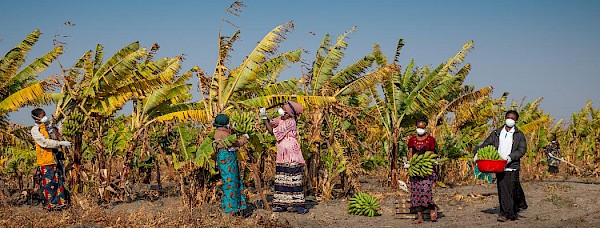
Alain Mukoj of Kamoa Copper (centre) inspecting a pineapple crop at a local community garden with Prince Kiluba (left) and Erick Kabwita (right).
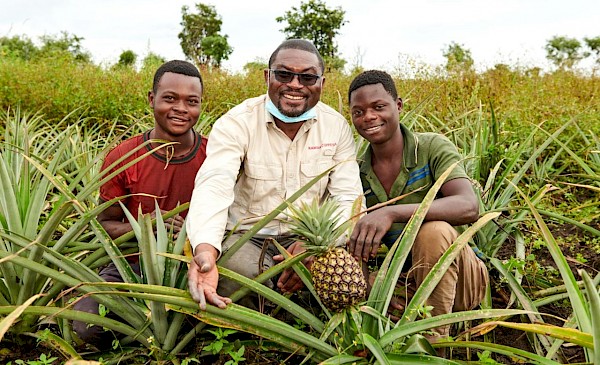
2. Platreef Project
64%-owned by Ivanhoe Mines
South Africa
The Platreef Project is owned by Ivanplats (Pty) Ltd (Ivanplats), which is 64%-owned by Ivanhoe Mines. A 26% interest is held by Ivanplats’ historically-disadvantaged, broad-based, black economic empowerment (B-BBEE) partners, which include 20 local host communities with approximately 150,000 people, project employees and local entrepreneurs. Ivanplats reached Level 4 contributor status in its most recent verification assessment on the B-BBEE scorecard. A Japanese consortium of ITOCHU Corporation, Japan Oil, Gas and Metals National Corporation, and Japan Gas Corporation, owns a 10% interest in Ivanplats, which it acquired in two tranches for a total investment of $290 million.
The Platreef Project hosts an underground deposit of thick, platinum-group metals, nickel, copper and gold mineralization on the Northern Limb of the Bushveld Igneous Complex in Limpopo Province – approximately 280 kilometres northeast of Johannesburg and eight kilometres from the town of Mokopane.
On the Northern Limb, platinum-group metals mineralization is primarily hosted within the Platreef, a mineralized sequence that is traced more than 30 kilometres along strike. Ivanhoe’s Platreef Project, within the Platreef’s southern sector, is comprised of two contiguous properties: Turfspruit and Macalacaskop. Turfspruit, the northernmost property, is contiguous with, and along strike from, Anglo Platinum’s Mogalakwena group of mining operations and properties.
Since 2007, Ivanhoe has focused its exploration and development activities on defining and advancing the down-dip extension of its original discovery at Platreef, now known as the Flatreef Deposit, which is amenable to highly-mechanized, underground mining methods. The Flatreef area lies entirely on the Turfspruit and Macalacaskop properties that form part of the company’s mining right.
Health and safety at Platreef
At the end of 2020, the Platreef Project reached a total of 59,213 lost-time, injury-free hours worked in accordance with South Africa’s Mine Health and Safety Act, and Occupational Health and Safety Act.
As previously reported on September 14, 2020, a tragic accident occurred in Shaft 1 as a result of a kibble bucket falling down the shaft and striking the northern side of the working platform. The legal review process into the accident as outlined by the South African Mine Health and Safety Act is ongoing. The Mine Health and Safety Inspectorate has completed its investigation under Section 60 of the Mine Health and Safety Act. Preliminary findings attributed the primary cause of the tragic accident to a very rare electronic device failure and that all mine safety standards and safe operating procedures were fully complied with. The work stoppage imposed was partially lifted in November 2020 and a full upliftment of the Section 54 stop order was received in January 2021, allowing full access to the Ivanplats team to continue with Shaft 1 equipping.
Leading industry specialists also assisted the Ivanplats team in determining the possible causes resulting in the accident to inform equipping decisions and to ensure reoccurrence is prevented.
Powerful economic results of the Platreef Integrated Development Plan 2020
On November 30, 2020, Ivanhoe Mines published the results of an independent Integrated Development Plan 2020 (IDP20) for the Platreef Project. The Platreef IDP20 encompasses two development scenarios:
- The Platreef 2020 feasibility study (Platreef 2020 FS) updates the feasibility results announced in July 2017. The Platreef 2020 FS evaluates the development of a 4.4 Mtpa underground mine with two concentrators built in modules of 2.2 Mtpa. This update takes into account development schedule advancement since 2017, as well as updated costs, metal prices and foreign exchange assumptions; in addition to increased throughput from 4.0 Mtpa to 4.4 Mtpa to utilize the full processing capacity of the two concentrators.
- The Platreef 2020 preliminary economic assessment (Platreef 2020 PEA) evaluates an alternate, phased development plan that fast-tracks Platreef into production. The Platreef 2020 PEA evaluates a phased development plan starting with an initial 700-ktpa underground mine using the existing Shaft 1 and a new concentrator on site with a capacity of up to 770 ktpa. This phased development plan will be targeting high-grade mining areas in close proximity to the shaft with significantly lower initial capital costs. After first production has been achieved, Shaft 2 sinking will commence in tandem with the construction of two additional 2.2 Mtpa concentrator modules and ramp up of the initial concentrator to its full capacity of 770 ktpa. Total mine production will then ramp up to the envisaged steady-state production of 5.2 Mtpa. Should capital become available sooner, the development of Shaft 2 can be brought forward to accelerate the expansion.
Highlights of the Platreef 2020 FS, include:
- The Platreef 2020 FS evaluates the development of a 4.4-Mtpa underground mine with two concentrators built in modules of 2.2 Mtpa, which updates the 2017 FS by taking into account development schedule advancement, as well as updated costs, metal prices and foreign exchange assumptions.
- The FS has increased throughput from 4.0 Mtpa to 4.4 Mtpa to utilize the full processing capacity of the two concentrators, which is well within the mining and hoisting capability of Shaft 2.
- Tailings storage methodology has been modified to a dry-stack tailings facility – a sustainable and water-efficient method wherein tailings are placed and compacted in a mound that is concurrently rehabilitated with soil and vegetation during the operating life of the facility.
- The FS has an average annual production rate of 508,000 ounces of platinum, palladium, rhodium and gold (3PE+Au), plus 22 million pounds of nickel and 13 million pounds of copper, at a cash cost of $442 per ounce of 3PE+Au, net of by-products, and including sustaining capital costs.
- The project schedule is driven by the sinking of Shaft 2, a 10-metre-diameter shaft with total rock hoisting capacity of up to 6.0 Mtpa, plus a 40-tonne-capacity, double-deck man/material cage capable of transporting fully assembled load-haul-dump vehicles and other equipment to support the mine, with first production targeted in 2025.
- Initial capital cost of $1.4 billion for this option would result in an after-tax net present value at an 8% discount rate (NPV8%) of $1.8 billion and an internal rate of return (IRR) of 19.8%.
- At spot prices as at November 27, 2020, the NPV8% increases to $3.7 billion and the IRR increases to 28.4%.
Highlights of the Platreef 2020 PEA, include:
- The Platreef 2020 PEA evaluates the phased development of Platreef, with an initial 700-ktpa underground mine and a 770-ktpa capacity concentrator, targeting high-grade mining areas close the Shaft 1, with a significantly lower initial capital cost of $390 million.
- First concentrate production for this option is targeted in 2024, with the sinking of Shaft 2 recommencing in 2025 to coincide with the construction of two 2.2-Mtpa concentrators to be completed by 2029 and 2030. This would increase steady production to 5.2 Mtpa by using Shaft 2 as the primary production shaft.
- While the PEA considers the deferral of Shaft 2 sinking to 2025, this is a discrete decision that can commence at any point in time, pending funding.
- By utilizing the 825-ktpa rock-hoisting capacity (including up to 125 ktpa allocated for development rock) of Shaft 1, reduced initial development is required, targeting the nearest and highest-grade stopes with drift-and-fill mining.
- Cost estimates for the phased development plan are largely based on the Platreef 2020 FS, augmented with early drift-and-fill mining and a 770-ktpa concentrator and associated site infrastructure.
- For this option, the PEA envisages phase one during years 1 to 6 at an average annual production rate of 109,000 ounces of platinum, palladium, rhodium and gold (3PE+Au), plus 5 million pounds of nickel and 3 million pounds of copper followed by phase two during years 7 to 30 at an average annual production rate of 613,000 ounces of 3PE+Au, plus 27 million pounds of nickel and 16 million pounds of copper.
- The PEA envisages a life-of-mine cash cost of $460 per ounce of 3PE+Au, net of by-products, and including sustaining capital costs.
- The after-tax net present value at an 8% discount rate (NPV8%) is $1.6 billion with an internal rate of return (IRR) of 20.0%. At spot prices as at November 27, 2020, the NPV8% increases to $3.3 billion and the IRR increases to 29.1%.
- Construction of the 950-metre-level station near the bottom of Shaft 1 was recently completed. This station lies within a few hundred metres of the initial high-grade mining zone that would be targeted during the early years of the phased development plan under the 2020 PEA alternative development scenario.
- In parallel with the changeover of Shaft 1 for permanent hoisting, detailed engineering will take place in 2021 on the mine design, 770-ktpa concentrator and associated infrastructure design, which also will include the dry-stack tailings storage facility. In addition, amendments to the water use licence, waste licence and environmental impact assessment required for the phased development plan will be tabled. Following the completion of the changeover, off-shaft development would take place in early 2022, with the initial aim of establishing a ventilation raise to allow for the development of underground infrastructure from 2023.
All figures are on a 100%-project basis unless otherwise stated. The Platreef IDP20 was independently prepared on a 100%-basis by OreWin Pty Ltd. of Adelaide, Australia; Wood plc (formerly Amec Foster Wheeler) of Vancouver, Canada; SRK Consulting Inc. of Johannesburg, South Africa; Stantec Consulting International LLC of Phoenix, USA; DRA Global of Johannesburg, South Africa; and Golder Associates Africa of Midrand, South Africa.
Jan Mapeka, Junior Geologist, inspecting pieces of high-grade ore from the reef intersection. A large-scale sample of the ore is being used for metallurgical testing for the feasibility study on the 770-ktpa mine and concentrator.
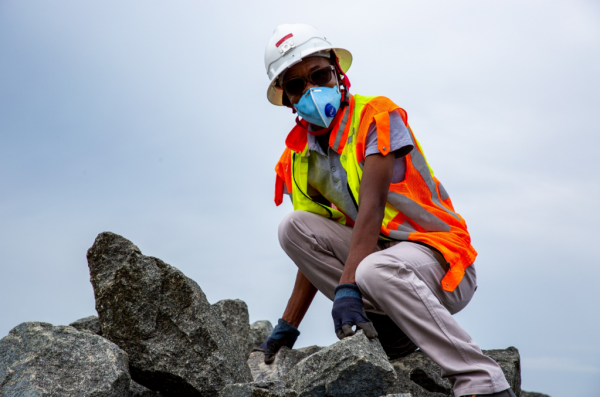
Arranging project-level financing of up to $420 million to advance development of Platreef
In February 2021, Ivanplats signed a non-binding term sheet with Orion Mine Finance, a leading international provider of production-linked stream financing to base and precious metals mining companies, for a $300 million gold, palladium and platinum streaming facility. The stream financing remains subject to completion of legal due diligence and structuring, as well as negotiation and execution of definitive documentation. The streaming facility is planned to be drawn down in four separate tranches, as needed, in parallel with the engineering studies to upgrade the Platreef 2020 PEA to a feasibility study and the changeover of Platreef’s Shaft 1 to a production shaft.
Ivanplats also appointed two prominent, international commercial banks – Societe Generale and Nedbank – as mandated lead arrangers for a senior project debt facility of up to $120 million. The senior project debt facility is scheduled to be utilized only after the streaming facility is fully drawn down. Definitive terms and conditions of the debt facility are subject to the completion of the feasibility study for Platreef’s phased development plan, completion of due diligence and structuring, as well as negotiation and execution of definitive documentation. Terms and conditions of the debt facility will be made available when finalized.
Shaft 1 changeover to a production shaft progressing well
The construction of the 996-metre-level station at the bottom of Shaft 1 was completed in July 2020. The completed Shaft 1 is located approximately 350 metres away from a high-grade area of the Flatreef orebody that is planned for bulk-scale, mechanized mining. The three development stations that will provide initial, underground access to the high-grade orebody have also been completed on the 750-, 850-, and 950-metre levels.
The changeover construction at Shaft 1, initially delayed following the September 14, 2020 accident, is progressing to plan and is on schedule for commencement of rock hoisting early in 2022. All equipment for the shaft changeover has been procured and is on site. The detailed engineering designs for the shaft changeover have been completed, reviewed and approved. The changeover work within the shaft will be conducted by Platreef’s experienced owners team.
The winder that was used to successfully sink Shaft 1 will be converted and re-equipped to function as the permanent rock, personnel and material winder for the life of mine. The shaft will be equipped with two 12.5-tonne skips (with hoisting capacity of 825,000 tonnes per year) and an interchangeable personnel and materials cage to accommodate the movement of personnel and materials up and down the shaft during the initial phase of mining.
The shaft will be equipped using rope guides for the main rock, personnel and materials conveyances. The stage and winder ropes used during the sinking phase have been removed, and the equipping stage, new permanent guide-ropes and the new permanent hoisting ropes have been delivered to site. Further to this, an auxiliary winder will be installed mainly to function as a man winder during the main rock hoisting cycle.
The construction of the winder foundations is underway and will be completed in time for the auxiliary winder installation and commissioning. The headgear, both winders, equipping stage, conveyances and control systems will comply with the highest industry safety standards, with proven and tested safety and redundancy systems in place.
Newly-designed rock chutes will connect the conveyors feeding the concentrator plant and the waste rock area, from where the rock will be converted to cemented backfill and also used for protection berms to contain storm water and reduce noise emissions.
The new ropes and the newly-designed and constructed equipping stage will be installed in the shaft by specialist contractors. The equipping in the shaft barrel is scheduled to commence at the end of March 2021 for completion by end of February 2022. Following the completion of the changeover work in the underground stations, and establishment of the ore and waste passes, lateral underground mine development will commence toward high-grade ore zones.
Early-works surface construction for Shaft 2 began in 2017. It includes the excavation of a surface box-cut to a depth of approximately 29 metres below surface and construction of the concrete hitch for the 103-metre-tall concrete headgear (headframe) that will house the shaft’s permanent hoisting facilities and support the shaft collar. Platreef’s budget for 2021 is $59 million, which includes $10 million for commencement of headframe construction for Shaft 2.
Platreef team members preparing Shaft 1’s headframe in advance of the installation of new ropes and the newly-designed and constructed equipping stage by specialist contractors.
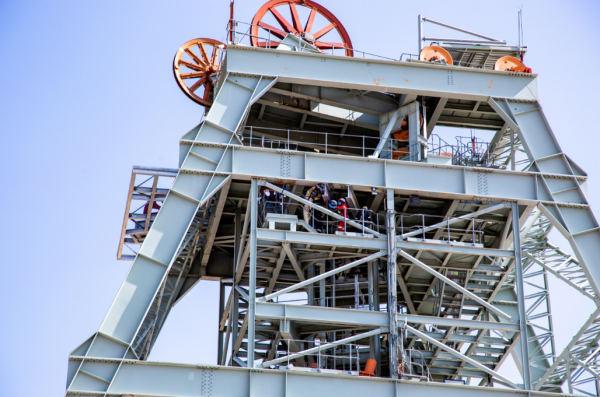
Vongani Nkuna, Group Manager, Metallurgy, is part of the team leading the development of Platreef, Ivanhoe’s second Tier One mine development project.
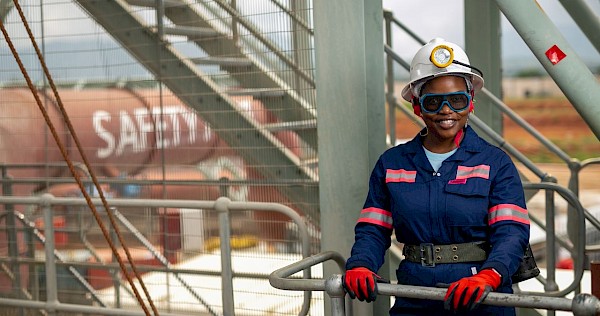
Underground mining to incorporate highly productive, mechanized methods
Mining zones in the current Platreef mine plan occur at depths ranging from approximately 700 metres to 1,200 metres below surface. Once expanded mine production is achieved, primary access to the mine will be by way of a 1,104-metre-deep, 10-metre-diameter production shaft (Shaft 2). Secondary access to the mine will be via the 996-metre-deep, 7.25-metre-diameter ventilation shaft (Shaft 1) that recently has been sunk to its final depth. During mine production, both shafts also will serve as ventilation intakes. Three additional ventilation exhaust raises (Ventilation Raise 1, 2, and 3) are planned to achieve steady-state production.
Mining will be performed using highly-productive mechanized methods, including long-hole stoping and drift-and-fill. Each method will utilize cemented backfill for maximum ore extraction. The production plans in both the PEA’s initial five-year drift-and-fill mining operation off of Shaft 1 and the larger FS expansion are focused on maximizing higher-grade areas, which was achieved through optimization based on stope locations, stope grades, mining method, and zone productivities. The orebody was targeted to recover approximately 125 million tonnes at the highest net smelter return.
The ore will be hauled from the stopes to a series of internal ore passes and fed to the bottom of Shaft 2, where it will be crushed and hoisted to surface.
Development of human resources and job skills
Consultation regarding the Platreef Project’s second Social and Labour Plan (SLP) is in the final stages. In this second SLP, Ivanplats plans to build on the foundation laid in the first SLP and continue with its training and development suite, which includes 15 new mentors, internal skills training for 78 staff members, a legends program to prepare retiring employees with new/other skills, community adult education training for host community members, core technical skills training for at least 100 community members, portable skills training, and more.
Local economic development projects will contribute to community water source development through the Mogalakwena Municipality boreholes program, as well as provide a significant funding contribution toward sanitation infrastructure at the municipality. Other projects, which will be undertaken in partnership with the neighbouring Anglo Mogalakwena Mine, include the refurbishment and equipping of a clinic in the Tshamahansi Village.
The enterprise and supplier development commitments comprise of expanding the existing kiosk and laundry facilities even further and adding expanded change house facilities to be managed by a community partner in the future. A five-year integrated business accelerator and funding project will assist community members interested to obtain help with development and supplier readiness.
During 2020, and in the absence of an approved SLP due to the COVID-19 pandemic, the Platreef Project has continued supporting a number of educational programs, including the e-learning project and the maintenance of science and computer laboratories, as well as the provision of free Wi-Fi in host communities. The Platreef Project also planted 25 trees at two local schools in the mine’s footprint area and promoted educational activities centered on climate change and health.
Victor Skinner, Winder Technician, installing cables at Shaft 1’s new winder house.
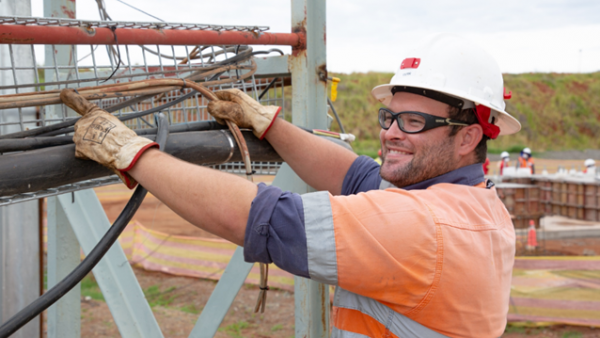
3. Kipushi Project
68%-owned by Ivanhoe Mines
Democratic Republic of Congo
The Kipushi copper-zinc-germanium-silver-lead mine in the DRC is adjacent to the town of Kipushi and approximately 30 kilometres southwest of Lubumbashi. It is located on the Central African Copperbelt, approximately 250 kilometres southeast of the Kamoa-Kakula Project and less than one kilometre from the Zambian border. Ivanhoe acquired its 68% interest in the Kipushi Project in November 2011; the balance of 32% is held by the state-owned mining company, Gécamines.
As part of the company’s cost-cutting measures announced on April 27, 2020, Ivanhoe’s board of directors allocated a reduced total budget for 2020 of $28.7 million for the Kipushi Project.
Health and safety at Kipushi
At the end of December 2020, the Kipushi Project reached a total of 2,918,693 work hours free of lost-time injuries and 766 lost-time injury-free shifts. It has been more than two years since the last lost-time injury occurred at the Kipushi Project.
In response to government-imposed travel restrictions and emergency protocols being introduced worldwide due to the COVID-19 pandemic, Kipushi has temporarily suspended mine development operations to reduce the risk to the workforce and local communities. The project maintained a reduced workforce to safely and cost-effectively maintain infrastructure and pumping systems and to execute planned projects.
The Kipushi Project operates a potable-water station for the daily supply of water to the municipality of Kipushi. This support includes power supply, disinfectant chemicals, routine maintenance, security, and emergency repair of leaks to the primary reticulation. During 2020, two additional solar-power boreholes were established, providing clean potable water to a further two host communities near Kipushi and bringing the total number of boreholes to seven.
Other community development projects included the donation of 5,000 N95 face masks to host communities, the donation of additional infrared thermometers to the Health Zone management, and the sponsorship of a COVID-19 awareness campaign broadcast on local radio. Additional COVID-19 awareness efforts include signboards erected throughout the town and a motorized caravan that rotates within urban and rural areas thrice per week, broadcasting prevention messages. The sewing training centre project produces cloth face masks and donates approximately 2,000 masks a month to host communities.
During 2020, the Kipushi Project has implemented a Sustainable Livelihoods Program, commencing with a poultry farming initiative established for the benefit of a consortium of local women.
Kipushi’s definitive feasibility study in final stages of completion
The Kipushi Project’s pre-feasibility study (PFS), announced by Ivanhoe Mines on December 13, 2017, anticipated annual production of an average of 381,000 tonnes of zinc concentrate over an 11-year, initial mine life at a total cash cost of approximately $0.48 per pound (lb) of zinc.
Highlights of the PFS, based on a long-term zinc price of $1.10/lb, include:
- After-tax net present value (NPV) at an 8% real discount rate of $683 million.
- After-tax real internal rate of return (IRR) of 35.3%.
- After-tax project payback period of 2.2 years.
- Pre-production capital costs, including contingency, of $337 million.
- Existing surface and underground infrastructure allows for significantly lower capital costs than comparable greenfield development projects.
- Life-of-mine average planned zinc concentrate production of 381,000 dry tonnes per annum, with a concentrate grade of 59% zinc, is expected to rank Kipushi, once in production, among the world’s largest zinc mines.
All figures are on a 100%-project basis unless otherwise stated. Estimated life-of-mine average cash cost of $0.48/lb of zinc is expected to rank Kipushi, once in production, in the bottom quartile of the cash-cost curve for zinc producers internationally.
The draft feasibility study and development and financing plan for Kipushi are being reviewed by Ivanhoe Mines together with its partner Gécamines. It is anticipated that these discussions will be concluded with the finalization of the feasibility study and the agreement on the development and financing plan by mid-2021.
Project development and infrastructure
Although development and rehabilitation activities in the year ending December 31, 2020 were limited, significant progress has been made in recent years to modernize the Kipushi Mine’s underground infrastructure as part of preparations for the mine to resume commercial production, including upgrading a series of vertical mine shafts to various depths, with associated headframes, as well as underground mine excavations and infrastructure. A series of crosscuts and ventilation infrastructure still is in working condition and have been cleared of old materials and equipment to facilitate modern, mechanized mining. The underground infrastructure also includes a series of high-capacity pumps to manage the mine’s water levels, which now are easily maintained at the bottom of the mine.
Shaft 5 is eight metres in diameter and 1,240 metres deep and has been upgraded and re-commissioned. The main personnel and material winder has been upgraded and modernized to meet international industry standards and safety criteria. The Shaft 5 rock-hoisting winder also is fully operational with new rock skips, new head- and tail-ropes, and attachments installed. The two newly-manufactured rock conveyances (skips) and the supporting frames (bridles) have been installed in the shaft to facilitate the hoisting of rock from the main ore and waste storage silos feeding rock on the 1,200-metre level.
The main haulage way on the 1,150-metre level, between the Big Zinc access decline and Shaft 5 rock load-out facilities, has been resurfaced with concrete so the mine now can use modern, trackless, mobile machinery. A new truck-tipping bin, which feeds into the large-capacity rock crusher located directly below, has been installed on this level. The old winder at P2 Shaft has been removed and construction of the new foundation, along with assembly and installation of the new modern winder, has been completed and fully commissioned after passing safety inspection and testing procedures.
Crew performing maintenance at Kipushi’s 850-metre-level pumping station.
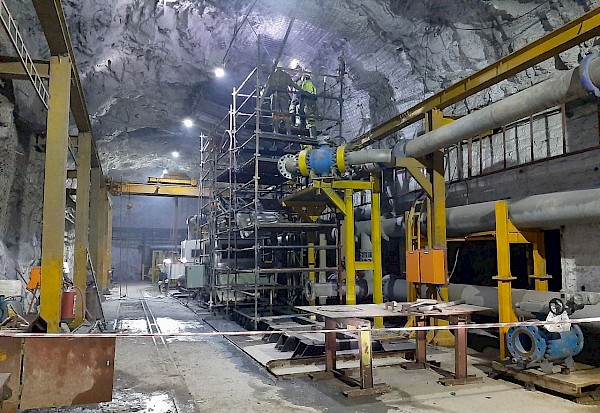
Kyungu Kabulo, Instrumentation Assistant (left), and Junior Kisula Ngoy, Instrumentation Engineer (right), installing probes and a balance disk on a Grifo pump at Kipushi’s 1,200-metre-level pumping station.
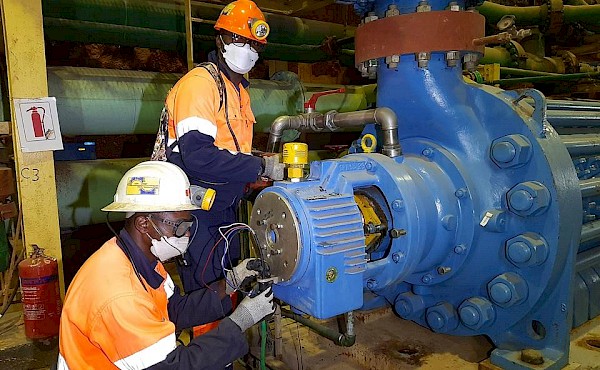
4. Western Foreland Exploration Project
100%-owned and 90%-owned by Ivanhoe Mines
Democratic Republic of Congo
Ivanhoe’s DRC exploration group is targeting Kamoa-Kakula-style copper mineralization through a regional exploration and drilling program on its Western Foreland exploration licences, located to the north, south and west of the Kamoa-Kakula Project. Ivanhoe’s Western Foreland Exploration Project consists of 17 licences that cover a combined area of approximately 2,550 square kilometres.
Exploration models that successfully led to the discoveries of Kakula, Kakula West, and the Kamoa North Bonanza Zone on the Kamoa-Kakula joint-venture mining licence, are being applied to the Western Foreland extensive land package by the same team of exploration geologists responsible for the previous discoveries.
Exploration activities at the Western Foreland area continued during Q4 2020 with the field season ending in mid-December. The target of the 2020 field season was to increase geological understanding for the new permits, as well as to generate targets for future exploration and drilling. Drilling focused on wide-spaced drill holes along strike to the west of the Makoko Deposit. The drill core from the program is being processed for analysis and detailed rock physical property test work also is carried out to further geological understanding, as well as the ability of the data to be used for future larger-scale geophysical test work and analysis.
The 2020 field season focused initially on a program of validation work on each of the permits to provide a required report back to the government and fulfil legal obligations. The majority of the field season focused on initial mapping of the sub-crop region with the collection of grab samples, mapping of exposed rocks in streams and rivers, and stream and surface sampling.
In Q4 2020, a total of eight new diamond drill holes were completed at the Makoko prospect and along strike of Makoko to the west. The drilling aimed to confirm the continuation of prospective lower Nguba stratigraphy westwards toward the new exploration permits. Diamond drilling was completed on northwest-southeast fences every 1,000 metres, with typically two to three holes drilled on each fence and spaced approximately 200 metres apart. Holes drilled generally were around 400 to 500 metres deep, with some shallower holes. A total of 3,412 metres were drilled during the quarter. Exploration also continued on the Western Foreland exploration licences with strict procedures in place to protect employees and drilling contractors from COVID-19. The exploration work, as well as drilling, included field mapping, stream sediment and soil sampling. In total, 347 stream sediment samples and 116 soil samples were collected and processed for preliminary XRF (pXRF) analysis on-site, then exported for external assay analysis.
The total data collected during 2020 was 958 soil samples, 411 stream samples, 133 rock grab samples and 981 mapping points. A total of 21 holes totalling 8,212 metres were drilled during 2020. The remaining set of soil, rock chips, stream and diamond drilling samples were dispatched to Bureau Veritas laboratory in Perth at the end of the year.
On February 10, 2021, Ivanhoe Mines announced that assay results from drilling completed in early 2020 confirm the extension of the Kamoa North high-grade copper structure for at least 800 metres in the Kiala Discovery area.
The high-grade copper zone at the Kiala Discovery was originally discovered on the Kamoa-Kakula mining licence and delineated through a series of step-out fences of holes drilled on 100-metre spacings in a northerly direction onto Ivanhoe’s 100%-owned exploration licences.
The structure controlling the zone of high-grade copper remains open to the north, and Ivanhoe now has secured 35 kilometres of highly-prospective, 100%-owned exploration ground along trend and to the north of the Kiala Discovery.
Selected drill holes at the Kiala Discovery include:
- DKIA_DD007 intersected 7.21 metres (true width) of 7.98% copper, at a 1% and 2% copper cut-off, from 345.44 metres down hole.
- DKIA_DD011 intersected 3.82 metres (true width) of 5.35% copper, at a 1% and 2% copper cut-off, from 348.00 metres down hole.
- DKIA_DD014 intersected 5.30 metres (true width) of 12.42% copper, at a 1% and 2% copper cut-off, from 366.70 metres down hole.
- DKIA_DD016 intersected 3.59 metres (true width) of 9.71% copper, at a 1% and 2% copper cut-off, from 351.40 metres down hole.
Drilling at the Kiala Discovery in early 2020.
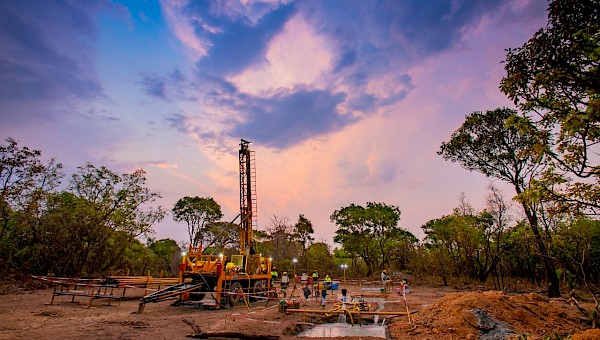
Plan view of the Kiala high-grade zone showing copper grades.
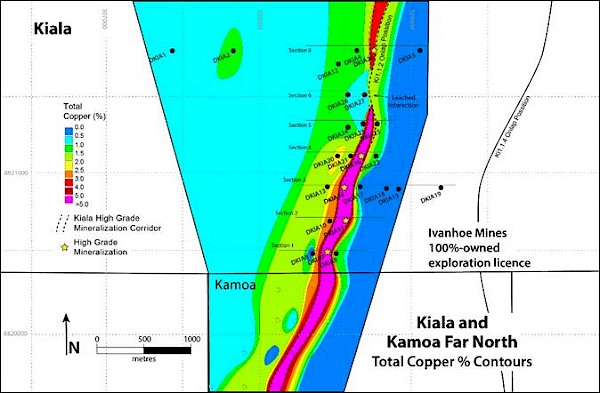
On February 10, 2021, Ivanhoe Mines also announced that drilling at the Makoko Sud Discovery intercepted significant, shallow copper mineralization (including up to 6.01 metres grading 3.38% copper) over a 7.5-kilometre strike length in a south-westerly direction along strike from the initial Makoko Sud Discovery area. Road clearance commenced in the second half of 2020 to extend the current exploration opportunities to the south and west from Makoko Sud.
Significant new drill intercepts from Makoko West include:
- DMKK_DD117, a 3.6-kilometre step-out hole from previous Makoko Sud drilling, intersected 6.01 metres (true width) of 3.38% copper, at a 2% copper cut-off from 259.72 metres down hole and 9.75 metres (true width) of 2.63% copper at a 1% copper cut-off.
- DMKK_DD118, a 1.6-kilometre step-out hole from previous Makoko Sud drilling, intersected 4.19 metres (true width) of 3.01% copper, at a 2% copper cut-off from 209.50 metres down hole and 5.15 metres (true width) of 2.78% copper at a 1% copper cut-off.
- DMKK_DD123, a 7.5-kilometre step-out hole from previous Makoko Sud drilling, intersected 3.33 metres (true width) of 1.44% copper, at a 2% copper cut-off from 570 metres down hole and 17.77 metres (true width) of 1.39% copper at a 1% copper cut-off.
The recent Makoko West drilling is extremely significant for the exploration potential of the new exploration permits as it demonstrates that the target stratigraphy extends westward and that the copper mineralizing system on the western edge of the basin is laterally extensive. Future drilling in the Makoko West area will target specific structural locations that are conducive to developing higher copper grades.
The planned high-resolution magnetic and radiometric survey commenced during Q4 2020 and continued through until the end of December. In total, 61% of the data acquisition was completed during 2020 with the remainder planned for the first half of 2021. Preliminary data and imagery were received during the acquisition, as different areas were flown.
Construction of a 16-kilometre road to gain access to new exploration target areas on the new western permits began during Q4 2020, running from the Makoko exploration area out to the west. The work will continue until the end of Q1 2021. In addition, a new bridge over the Lubudi River will be constructed to gain access to new exploration permits. Bridge construction started in Q4 2020 and is expected to be completed at the end of Q1 2021 in preparation for the dry season.
The initial 2021 exploration program includes 40,000 metres of combined aircore and diamond drilling, airborne and ground-based geophysics, soil sampling and road construction. Fieldwork will begin at the start of the 2021 dry season, which typically begins in April. The initial 2021 budget is $16 million, which may be expanded based on program results. Much of this year’s exploration will focus on the more than 1,700 square kilometres of new, 100%-owned permits that were acquired in 2019 and received environmental certification in 2020.
SELECTED ANNUAL FINANCIAL INFORMATION
This selected financial information is in accordance with IFRS as presented in the annual consolidated financial statements. Ivanhoe had no operating revenue in any financial reporting period and did not declare or pay any dividend or distribution in any financial reporting period.
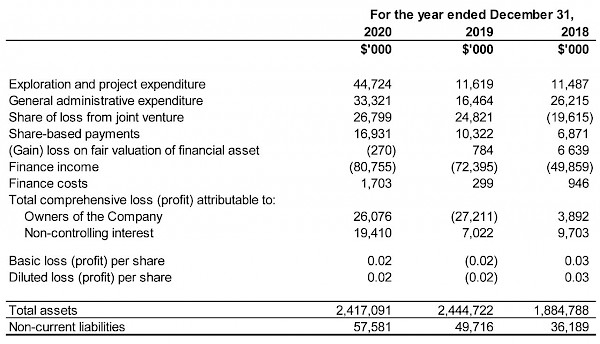
DISCUSSION OF RESULTS OF OPERATIONS
Review of the year ended December 31, 2020 vs. December 31, 2019
The company recorded total comprehensive loss of $45.5 million for the year ended December 31, 2020, compared to a total comprehensive income of $20.2 million for the year ended December 31, 2019.
Exploration and project expenditure amounted to $44.7 million for the year ended December 31, 2020 and was $33.1 million more than for the same period in 2019 ($11.6 million). While all the exploration and project expenditure incurred in 2019 related to exploration at Ivanhoe’s 100%-owned Western Foreland exploration licences, 2020 also included $36.2 million spent at the Kipushi Project which was on reduced activities and incurred limited cost of a capital nature in 2020.
The main classes of expenditure at the Kipushi Project for the year ended December 31, 2020, and for the same period in 2019 are set out in the following table:
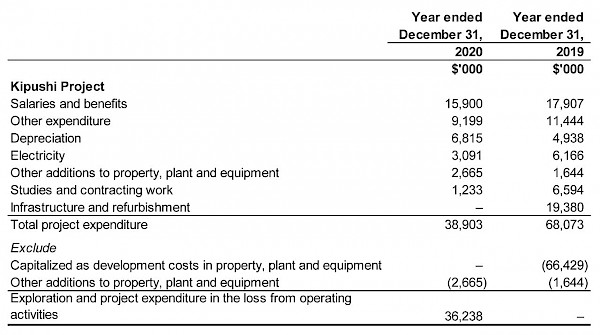
Finance income amounted to $80.8 million for the year ended December 31, 2020, and $72.4 million for the same period in 2019. Included in finance income is the interest earned on loans to the Kamoa Holding joint venture to fund operations that amounted to $70.4 million for 2020, and $53.5 million for 2019. Interest increased as the accumulated loan balance increased. Interest received on cash and cash equivalents decreased due to interest rate cuts by the US Federal Reserve.
The company recognized a foreign exchange gain of $14.9 million for the year ended December 31, 2019, compared to a foreign exchange loss of $0.6 million for the same period for 2020. The gain in 2019 resulted from the company converting Canadian Dollar cash to U.S. dollars at favourable exchange rates.
The company’s share of losses from the Kamoa Holding joint venture was $26.8 million for the year ended December 31, 2020, compared to a loss of $24.8 million for the same period in 2019, the breakdown of which is summarized in the following table:
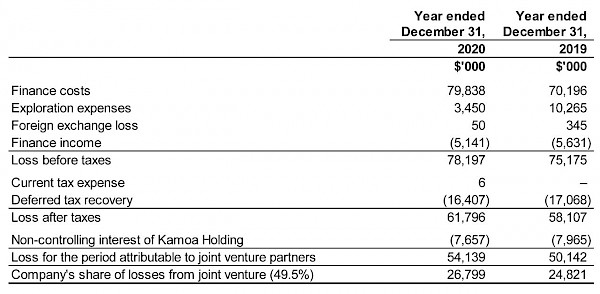
The interest expense in the Kamoa Holding joint venture relates to shareholder loans where each shareholder is required to fund Kamoa Holding in an amount equivalent to its proportionate shareholding interest. The company is advancing Crystal River’s portion on its behalf in return for an increase in the promissory note due to Ivanhoe.
Financial position as at December 31, 2020 vs. December 31, 2019
The company’s total assets decreased by $27.6 million, from $2,444.7 million as at December 31, 2019, to $2,417.1 million as at December 31, 2020. The company utilized $60.5 million of its cash resources in its operations and received interest of $4.6 million on cash and cash equivalents during the year ended December 31, 2020.
The net increase of property, plant and equipment amounted to $29.6 million, with a total of $41.9 million being spent on project development and to acquire other property, plant and equipment. Of this total, $37.7 million pertained to development costs and other acquisitions of property, plant and equipment at the Platreef Project.
The main components of the additions to property, plant and equipment – including capitalized development costs – at the Platreef Project for the year ended December 31, 2020, and for the same period in 2019, are set out in the following table:
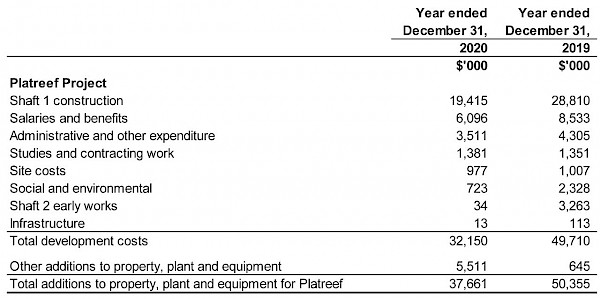
Costs incurred at the Platreef Project are deemed necessary to bring the project to commercial production and are therefore capitalized as property, plant and equipment.
The company’s investment in the Kamoa Holding joint venture increased by $376.9 million from $912.6 million as at December 31, 2019, to $1,289.5 million as at December 31, 2020, with each of the current shareholders funding the operations equivalent to their proportionate shareholding interest. The company’s portion of the Kamoa Holding joint venture cash calls amounted to $333.3 million during the year ended December 31, 2020, while the company’s share of losses from the joint venture amounted to $26.8 million.
The company’s investment in the Kamoa Holding joint venture can be broken down as follows:

The Kamoa Holding joint venture’s net increase in property, plant and equipment from December 31, 2019, to December 31, 2020, amounted to $589.3 million and can be further broken down as follows:
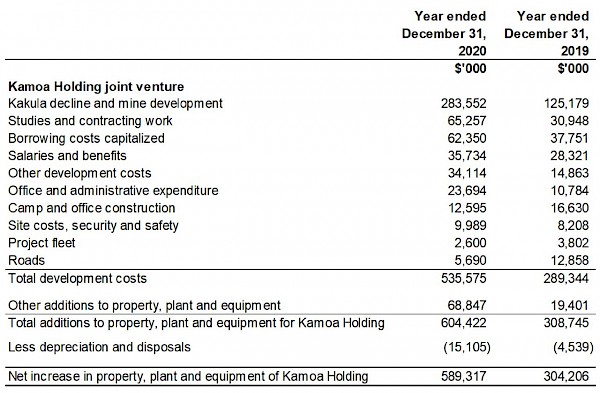
The company’s total liabilities decreased by $1.3 million to $80.6 million as at December 31, 2020, from $81.9 million as at December 31, 2019, due to a $3.9 million decrease in the lease liability.
SELECTED QUARTERLY FINANCIAL INFORMATION
The following table summarizes selected financial information for the prior eight quarters. Ivanhoe had no operating revenue in any financial reporting period and did not declare or pay any dividend or distribution in any financial reporting period.
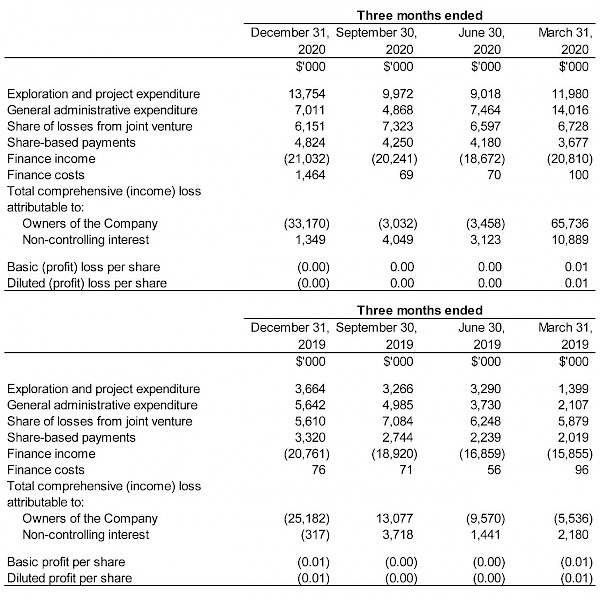
Review of the three months ended December 31, 2020 vs. December 31, 2019
The company recorded total comprehensive income of $31.8 million for Q4 2020 compared to $25.5 million for the same period in 2019. The majority of the income in Q4 2020 mainly was due to an exchange gain on translation of foreign operations of $42.7 million resulting from the strengthening of the South African Rand from September 30, 2020, to December 31, 2020. The company recognized an exchange gain on translation of foreign operations in Q4 2019 of $20.7 million.
Salaries and benefits of $3.5 million for Q4 2020 was $3.9 million less than for the same period in 2019 ($7.4 million) due to the company suspending short-term incentive award payments to senior management, reducing its global office footprint and reducing its senior management headcount as part of company-wide, cash-saving measures.
Finance income for Q4 2020, amounted to $21.0 million, and was $0.2 million more than for the same period in 2019 ($20.8 million). Included in finance income is the interest earned on loans to the Kamoa Holding joint venture to fund operations that amounted to $19.8 million for Q4 2020, and $15.1 million for the same period in 2019. Interest increased as the accumulated loan balance increased. Interest received on cash and cash equivalents decreased due to interest rate cuts by the US Federal Reserve.
Exploration and project expenditure amounted to $13.8 million in Q4 2020 and $3.7 million for the same period in 2019. While all the exploration and project expenditure incurred in Q4 2019 related to exploration at Ivanhoe’s 100%-owned Western Foreland exploration licences, Q4 2020 also included $11.0 million spent at the Kipushi Project which incurred limited costs of a capital nature in the quarter due to reduced activities. The main classes of expenditure at the Kipushi Project in Q4 2020 and Q4 2019 are set out in the following table:
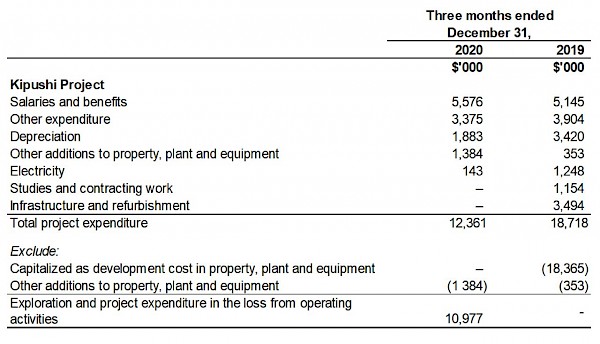
The company’s share of losses from the Kamoa Holding joint venture increased from $5.6 million in Q4 2019 to $6.2 million in Q4 2020. The following table summarizes the company’s share of the losses of Kamoa Holding for the three months ended December 31, 2020, and for the same period in 2019:

The finance costs in the Kamoa Holding joint venture relates to shareholder loans where each shareholder is required to fund Kamoa Holding in an amount equivalent to its proportionate shareholding interest. The company is advancing Crystal River’s portion on its behalf in return for an increase in the promissory note due to Ivanhoe.
LIQUIDITY AND CAPITAL RESOURCES
The company had $262.8 million in cash and cash equivalents as at December 31, 2020. At this date, the company had consolidated working capital of approximately $308.0 million, compared to $688.5 million as at December 31, 2019.
Since December 8, 2015, each shareholder in Kamoa Holding has been required to fund Kamoa Holding in an amount equivalent to its proportionate shareholding interest. The company is advancing Crystal River’s portion on its behalf in return for an increase in the promissory note due to Ivanhoe.
The Platreef Project’s current expenditure is being funded solely by Ivanhoe, through an interest bearing loan to Ivanplats, as the Japanese consortium has elected not to contribute to current expenditures.
The company’s main objectives for 2021 at the Platreef Project is the detailed engineering and updated feasibility study for the phased development plan, progression of the Shaft 1 changeover and the construction of the Shaft 2 headframe to the collar. At Kipushi, cost-saving measures will continue until the finalization of the feasibility study and the development and financing plan is agreed. Mine development at the Kamoa-Kakula Project continues with first production now expected in July 2021 and the Phase 2 concentrator expansion is being fast tracked. The company has budgeted to spend $59 million on further development at the Platreef Project; $27 million at the Kipushi Project; and $28 million on corporate overheads for 2021. Exploration activities on the Western Foreland’s exploration project in DRC will continue in 2021 with an initial budget of $16 million, which may be expanded based on program results. The company’s proportionate funding of the Kamoa-Kakula Project is expected to be $154million for 2021, with the assumption that additional equipment purchases would be funded through the equipment financing facilities and that expenditure on Kamoa-Kakula’s Phase 2 would be funded through the limited recourse line of credit from Zijin.
As Ivanhoe continues to advance its projects, the company’s management has reviewed and assessed numerous alternatives to finance its share of construction costs for the Kakula Copper Mine and to advance exploration and development initiatives at its other projects in Southern Africa. These alternatives include, but are not limited to, existing liquidity sources, including cash, receivables and investments, selling assets, project financing, streaming or royalty transactions, and equipment and debt financing. While Ivanhoe expects that it will continue to have sufficient cash resources or project-related financing options available to cover its share of the initial capital costs at the Kakula Mine, the company will continue to seek out and review opportunities presented to Ivanhoe, having regard to the best interests of Ivanhoe as well as to Ivanhoe’s operations and financial position, industry conditions and geopolitical considerations.
The company is required to fund its Kamoa Holding joint venture in an amount equivalent to its proportionate shareholding interest.
This news release should be read in conjunction with Ivanhoe Mines’ audited 2020 Financial Statements and Management’s Discussion and Analysis report available at www.ivanhoemines.com and at www.sedar.com .
Qualified Persons and NI 43-101 Technical Reports
Disclosures of a scientific or technical nature regarding the revised capital expenditure and development scenarios at the Kamoa-Kakula Project in this news release have been reviewed and approved by Steve Amos, who is considered, by virtue of his education, experience and professional association, a Qualified Person under the terms of NI 43-101. Mr. Amos is not considered independent under NI 43-101 as he is the Head of the Kamoa Project. Mr. Amos has verified the technical data disclosed in this news release.
Other disclosures of a scientific or technical nature regarding the Kakula and Kansoko stockpiles in this news release have been reviewed and approved by George Gilchrist, who is considered, by virtue of his education, experience and professional association, a Qualified Person under the terms of NI 43-101. Mr. Gilchrist is not considered independent under NI 43-101 as he is the Vice President, Resources of Ivanhoe Mines. Mr. Gilchrist has verified the other technical data disclosed in this news release.
Other disclosures of a scientific or technical nature in this news release have been reviewed and approved by Stephen Torr, who is considered, by virtue of his education, experience and professional association, a Qualified Person under the terms of NI 43-101. Mr. Torr is not considered independent under NI 43-101 as he is the Vice President, Project Geology and Evaluation. Mr. Torr has verified the other technical data disclosed in this news release.
Ivanhoe has prepared a current, independent, NI 43-101-compliant technical report for each of the Platreef Project, the Kipushi Project and the Kamoa-Kakula Project, which are available under the company’s SEDAR profile at www.sedar.com :
- The Kamoa-Kakula Integrated Development Plan 2020 dated October 13, 2020, prepared by OreWin Pty Ltd., China Nerin Engineering Co., Ltd., DRA Global, Epoch Resources, Golder Associates Africa, KGHM Cuprum R&D Centre Ltd., Outotec Oyj, Paterson and Cooke, Stantec Consulting International LLC, SRK Consulting Inc., and Wood plc., covering the company’s Kamoa-Kakula Project;
- The Platreef Integrated Development Plan 2020 dated December 6, 2020, prepared by OreWin Pty Ltd., Wood plc (formerly Amec Foster Wheeler), SRK Consulting Inc., Stantec Consulting International LLC, DRA Global, and Golder Associates Africa, covering the company’s Platreef Project; and
- The Kipushi 2019 Mineral Resource Update dated March 28, 2019, prepared by OreWin Pty Ltd., MSA Group (Pty) Ltd., SRK Consulting (South Africa) (Pty) Ltd, and MDM (Technical) Africa Pty Ltd. (a division of Wood PLC), covering the company’s Kipushi Project.
These technical reports include relevant information regarding the effective dates and the assumptions, parameters and methods of the mineral resource estimates on the Platreef Project, the Kipushi Project and the Kamoa-Kakula Project cited in this news release, as well as information regarding data verification, exploration procedures and other matters relevant to the scientific and technical disclosure contained in this news release in respect of the Platreef Project, Kipushi Project and Kamoa-Kakula Project.
Information contacts
Investors
Bill Trenaman +1.604.331.9834
Media
Matthew Keevil +1.604.558.1034
Website www.ivanhoemines.com
Forward-looking statements
Certain statements in this news release constitute “forward-looking statements” or “forward-looking information” within the meaning of applicable securities laws. Such statements and information involve known and unknown risks, uncertainties and other factors that may cause the actual results, performance or achievements of the company, its projects, or industry results, to be materially different from any future results, performance or achievements expressed or implied by such forward-looking statements or information. Such statements can be identified by the use of words such as “may”, “would”, “could”, “will”, “intend”, “expect”, “believe”, “plan”, “anticipate”, “estimate”, “scheduled”, “forecast”, “predict” and other similar terminology, or state that certain actions, events or results “may”, “could”, “would”, “might” or “will” be taken, occur or be achieved. These statements reflect the company’s current expectations regarding future events, performance and results and speak only as of the date of the company’s MD&A for the year ended December 31, 2020.
Such statements include without limitation, the timing and results of: (i) statements regarding the capital costs remaining until initial production for the Kamoa-Kakula joint venture estimated at $336 million as of December 31, 2020; (ii) statements that Ivanhoe expects that it will have sufficient cash resources, or financing options available, to cover its proportionate share of the remaining initial capital costs at the Kamoa-Kakula Project; (iii) statements regarding progress and schedule of the Kamoa-Kakula Project’s concentrator plant, including that it remains on track to be mechanically complete in Q2 2021, with first copper concentrate production scheduled for July 2021; (iv) statements that construction of the Kamoa-Kakula backfill plant is progressing in parallel with the concentrator plant and is expected to be commissioned in July 2021; (v) statements regarding the expected progress on other construction at the Kamoa-Kakula Project, including that the tailings storage facility is scheduled to be completed well ahead of the required date; (vi) statements that the Kamoa-Kakula Project will continue to add additional crews and that the pace of underground development is expected to continue to accelerate as additional mining crews are mobilized; (vii) statements that Kamoa-Kakula is on track to have more than three million tonnes of high-grade and medium-grade ore stockpiled on surface, holding more than 125,000 tonnes of contained copper, prior to the planned start of processing in July 2021; (viii) statements that Kakula is expected to produce an extremely high grade and clean copper concentrate (containing over 55% copper) that will be highly coveted by copper smelters around the world; (ix) statements regarding the Kamoa-Kakula Project being among the world’s lowest greenhouse gas emitters per unit of copper produced; (x) statements regarding refurbishment of six turbines at the Mwadingusha hydro-electric power plant and that electricity from all of Mwadingusha’s six turbines are expected to be integrated into the national power grid in the second quarter of 2021; (xi) statements regarding the Platreef Project’s streaming facility, including that it is planned to be drawn down in four separate tranches; (xii) statements regarding the Platreef Projects’ Shaft 1 changeover including that it is expected to be completed by February 2022; (xiii) statements regarding the planned mining methods at Platreef will use highly productive, mechanized methods, including long-hole stoping and drift-and-fill mining, and that each method will utilize cemented backfill for maximum ore extraction; (xiv) statements that the draft feasibility study and development and financing plan for Kipushi are being reviewed by Ivanhoe Mines together with its partner Gécamines and that it is anticipated that these discussions will be concluded with the finalization of the feasibility study and the agreement on the development and financing plan by mid-2021; (xv) statements regarding future drilling in the Makoko West area including that it will target specific structural locations that are conducive to developing higher copper grades; (xvi) statements that mine development at the Kamoa-Kakula Project continues with first production now expected in July 2021 and the Phase 2 concentrator expansion is being fast tracked; (xvii) statements regarding the expected expenditure for 2021 of $59 million on further development at the Platreef Project; $27 million at the Kipushi Project; $16 million on regional exploration in the DRC; and $28 million on corporate overheads – as well as its proportionate funding of the Kamoa-Kakula Project, expected to be $154 million for 2021.
As well, all of the results of the pre-feasibility study for the Kakula copper mine and the updated and expanded Kamoa-Kakula Project preliminary economic assessment, the feasibility study of the Platreef Project and the pre-feasibility study of the Kipushi Project, constitute forward-looking statements or information, and include future estimates of internal rates of return, net present value, future production, estimates of cash cost, proposed mining plans and methods, mine life estimates, cash flow forecasts, metal recoveries, estimates of capital and operating costs and the size and timing of phased development of the projects. Furthermore, with respect to this specific forward-looking information concerning the development of the Kamoa-Kakula, Platreef and Kipushi projects, the company has based its assumptions and analysis on certain factors that are inherently uncertain. Uncertainties include: (i) the adequacy of infrastructure; (ii) geological characteristics; (iii) metallurgical characteristics of the mineralization; (iv) the ability to develop adequate processing capacity; (v) the price of copper, nickel, zinc, platinum, palladium, rhodium and gold; (vi) the availability of equipment and facilities necessary to complete development; (vii) the cost of consumables and mining and processing equipment; (viii) unforeseen technological and engineering problems; (ix) accidents or acts of sabotage or terrorism; (x) currency fluctuations; (xi) changes in regulations; (xii) the compliance by joint venture partners with terms of agreements; (xiii) the availability and productivity of skilled labour; (xiv) the regulation of the mining industry by various governmental agencies; (xv) the ability to raise sufficient capital to develop such projects; (xvi) changes in project scope or design, and (xvii) political factors.
This news release also contains references to estimates of Mineral Resources and Mineral Reserves. The estimation of Mineral Resources is inherently uncertain and involves subjective judgments about many relevant factors. Estimates of Mineral Reserves provide more certainty but still involve similar subjective judgments. Mineral Resources that are not Mineral Reserves do not have demonstrated economic viability. The accuracy of any such estimates is a function of the quantity and quality of available data, and of the assumptions made and judgments used in engineering and geological interpretation (including estimated future production from the company’s projects, the anticipated tonnages and grades that will be mined and the estimated level of recovery that will be realized), which may prove to be unreliable and depend, to a certain extent, upon the analysis of drilling results and statistical inferences that ultimately may prove to be inaccurate. Mineral Resource or Mineral Reserve estimates may have to be re-estimated based on: (i) fluctuations in copper, nickel, zinc, platinum group elements (PGE), gold or other mineral prices; (ii) results of drilling; (iii) metallurgical testing and other studies; (iv) proposed mining operations, including dilution; (v) the evaluation of mine plans subsequent to the date of any estimates and/or changes in mine plans; (vi) the possible failure to receive required permits, approvals and licences; and (vii) changes in law or regulation.
Forward-looking statements and information involve significant risks and uncertainties, should not be read as guarantees of future performance or results and will not necessarily be accurate indicators of whether or not such results will be achieved. A number of factors could cause actual results to differ materially from the results discussed in the forward-looking statements or information, including, but not limited to, the factors discussed below and under “Risk Factors”, and elsewhere in the company’s MD&A for the year ended December 31, 2020, as well as unexpected changes in laws, rules or regulations, or their enforcement by applicable authorities; the failure of parties to contracts with the company to perform as agreed; social or labour unrest; changes in commodity prices; and the failure of exploration programs or studies to deliver anticipated results or results that would justify and support continued exploration, studies, development or operations.
Although the forward-looking statements contained in this news release are based upon what management of the company believes are reasonable assumptions, the company cannot assure investors that actual results will be consistent with these forward-looking statements. These forward-looking statements are made as of the date of this news release and are expressly qualified in their entirety by this cautionary statement. Subject to applicable securities laws, the company does not assume any obligation to update or revise the forward-looking statements contained herein to reflect events or circumstances occurring after the date of this news release.
The company’s actual results could differ materially from those anticipated in these forward-looking statements as a result of the factors set forth in the “Risk Factors” section and elsewhere in the company’s MD&A for the year ended December 31, 2020.


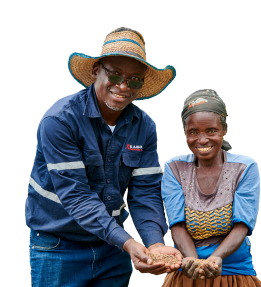
 English
English Français
Français 日本語
日本語 中文
中文